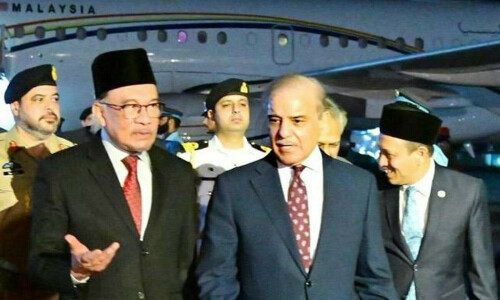NUMEROUS articles had appeared around the 90- to 100-day mark of the PML-N government to review its initial performance, in line with Western traditions.
Recognising how slowly things move in developing countries, I had decided that six months would be a more meaningful period even for an initial review and had consequently held my fire back then. As the government now completes its six months, it seems appropriate to review its initial performance.
Misbah-ul-Haq, Pakistan’s cricket captain, has earned the unfortunate nickname of Mr Tuk-tuk due to his slow batting and defensive captaincy. At the six-month mark, ‘tuk-tuk’ governance seems an appropriate title for the governance style of the PML-N given its slow pace and defensive manner in dealing with critical national problems.
The national problems that it faced after taking over in June 2013 fell into two categories. The first category included acute problems that had accumulated over the past decade or more, eg terrorism, Balochistan insurgency, Karachi violence, energy shortages and a stagnant economy.
The second category included chronic problems which have accumulated over several decades, eg inadequate investment in health, education, population services, infrastructure and disaster management; inefficient bureaucracy; inequitable economic and political structure; civil-military imbalance; and gender and minority grievances.
Unfortunately, on both sets of problems, the government has been largely hesitant, indecisive and slow, though, as with Misbah-ul-Haq, it has occasionally displayed a sudden rush of blood to hit a six on some issues, eg the Karachi operation, the Balochistan chief minister compromise, and certain meritorious appointments.
Juicy half-volleys have blandly been patted back to the bowler instead of being dispatched to the boundary. Consequently, numerous opportunities to solve these critical problems have been wasted.
It would be unrealistic to expect the PML-N government to have resolved all these problems within six months. However, it should have certainly developed a clear and convincing game plan for both acute and chronic problems by now and started tackling at least the acute problems aggressively. Unfortunately, this has not happened.
As the tortoise story reveals, slowness is not a problem as long as one is steady. Steadiness means having a clear idea of what one wants to do and where one wants to go and then consistently even if slowly making progress accordingly.
More than its slowness, it is unsteadiness, ie the lack of clear policy ideas on major issues that is the PML-N’s main problem.
This lack of clarity has been most evident in dealing with acute problems, especially related to terrorism. The government has failed to provide a clear and inspiring vision of why it thinks talks with the Taliban will succeed given their repeated failure in the past due to the non-cooperation ironically of the Taliban and the fickleness of the US.
In the area of economy too, the government has failed to show the necessary resolve to tax the rich and has instead followed the IMF dictates in increasing indirect taxes which disproportionately hurts the poor and the middle classes. Balochistan seems to have slipped off the radar completely and the problems there continue to fester and become worse.
Nevertheless, it is too soon to write the government’s obituary as it still enjoys several key advantages.
Firstly, it has time on hand to make a comeback since it is not playing a T20 match but a five-year Test match.
Secondly, the opposition is in disarray. The PPP is still smarting from its ignominious defeat in the 2013 elections and has become a regional party. Its own current performance in Sindh lags behind the PML-N’s in Punjab, making it difficult for it to present itself as a viable alternative in 2018.
The Pakistan Tehreek-i-Insaf is similarly struggling to contain problems in Khyber Pakhtunkhwa which is more difficult to govern than Punjab. Thus, it would be difficult for it to convince Punjab voters to reject the PML-N in 2018 so long as the latter can repeat even its 2008-2013 performance.
Thirdly, key stakeholders, eg, the army, the US and the judiciary seem inclined to be patient with the government.
Fourthly, the government enjoys considerable goodwill among the people. Recent surveys show reasonably high satisfaction with its performance. While the PPP, especially its top leadership, had quickly developed a reputation of crass unconcern towards public issues and being cynically self-serving, the PML-N is still seen as being more interested in solving pressing public problems.
Nawaz Sharif is still seen by many as someone keen to leave a positive legacy and create a name for himself in history. However, he must realise that the window of opportunity between making history and becoming history is exceedingly short.
To make progress, the PML-N will have to quickly develop clear and cogent policy ideas on all major issues.
This will require its top leadership to go beyond the small group of people who seem to dominate decision-making within the N-League and induct people having the skills to implement sound policies on a wide range of political and economic issues.
Fortunately, there is no shortage of qualified people within Pakistan. The only question is whether the PML-N can change its personalised patterns of governance where loyalty is preferred over talent.
The next 12 months will be critical for both the PML-N and Pakistan. The last six months have been a period of great flux in Pakistan as the five most powerful positions in Pakistan (that of the president, the prime minister, the army chief, the chief Justice — and the Taliban supremo) have all changed hands.
The new incumbents are gradually settling into their new positions. The decisions that they take in the coming months will determine Pakistan’s medium-term destiny.
The writer is a political economist at UC Berkeley.











































